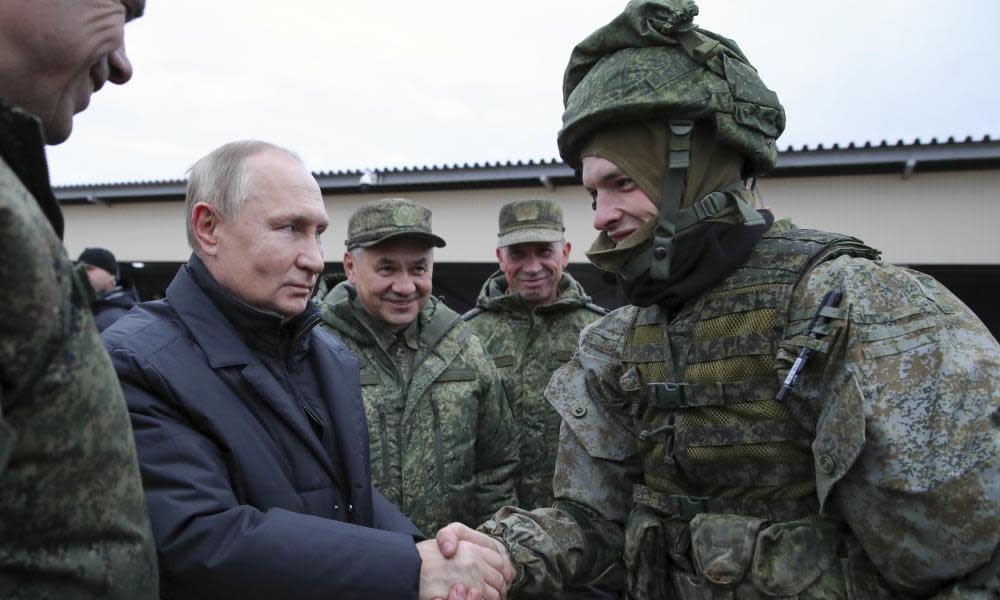Invasion by Luke Harding review – history in the making

The wheel of European history turned decisively in February when Russia invaded Ukraine. Most of us had thought for years that Russia had to be handled carefully because it was a damned nuisance to European security, but no worse than that; only a strategic threat if we let it be so. And we wondered what President Putin was really after while he went through the charade of threatening a full-scale invasion of a neighbouring country. He was a natural bully whose threats and bluster had nevertheless always been rather carefully calibrated. Surely, he would not commit the manifest folly of trying to invade the biggest territory in Europe – and 44 million people who didn’t want to be Russian – with fewer than 190,000 troops?
But he did – based on an intelligence failure and a bizarre mindset that makes the western invasion of Iraq in 2003 look like a bit of absent-mindedness. And it was immediately clear that if Russia didn’t win this war in the first three days, as it obviously intended, then it wouldn’t win it. But Putin won’t lose gracefully and an escalating, open-ended war in Europe is now upon us.
Luke Harding thinks carefully about how Putin’s Kremlin got itself into this mess. Defence minister Sergei Shoigu – not a day in the military, though he wears a courtesy uniform – is one of Putin’s old hiking friends and more instrumental than most in recasting Russian history into a romantic fantasy. Putin didn’t need much encouragement to rewrite the story in his own mind. It relegates Ukrainians to the status of a Slavic sub-species and places himself at the end of a direct line from Peter the Great, Catherine the Great and Joseph Stalin. Whether the hiking chums also took a prophesy from a Siberian shaman in spring 2021, pointing to the great redemption of Russian lands beginning in February 2022, as one of Harding’s contacts reports, remains unverified. But it wouldn’t surprise us any more.
Harding has been going to and from Ukraine for many years. He’s witnessed how much the country has changed since the 2014 conflict when Crimea and a third of the Donbas was seized by Russian forces and local separatists. Some countries forge a new society for themselves in time of war and Ukraine is now tragically in the blast furnace for the foreseeable future. By the end of his analysis Harding sees it emerging as “a proven state” through this nightmare; it is hard to disagree.
Whether the recent Ukrainian counter-offensives are actually a “tipping point” in the war, as he suggests, is less certain. Harding is pretty up to date describing Ukrainian successes and endless Russian military failures in Kharkiv, the Donbas, and Kherson in the south-west. The Russians are certainly losing ground. But after the attack on the Kerch Strait bridge in October, Moscow showed itself determined to dismantle Ukrainian society with outright air attacks on civilians and their infrastructure. As Russian commander Sergei Surovikin has put it: “I don’t want to sacrifice Russian soldiers’ lives in a guerrilla war against hordes of fanatics armed by Nato. We have enough technical means to force Ukraine to surrender.” So it’s no longer about displacing the “Nazis and drug addicts” in Kyiv, or protecting the Russian-speakers in the Donbas. For Moscow, the conflict is now officially what it was in reality back in February: a straight war of imperial conquest against a neighbour.
Journalism, it has been said for the last 80 years, “is the first rough draft of history”. Harding’s account is a very good first historical draft. And it’s really not so rough. His judgments will last – and, sadly, they will be relevant for a long time to come.
• Michael Clarke is visiting professor in war studies at King’s College London and author of Britain’s Persuaders: Soft Power in a Hard World. Invasion: The Inside Story of Russia’s Bloody War and Ukraine’s Fight for Survival by Luke Harding is published by Guardian Faber (£20). To support the Guardian and Observer order your copy at guardianbookshop.com. Delivery charges may apply.


